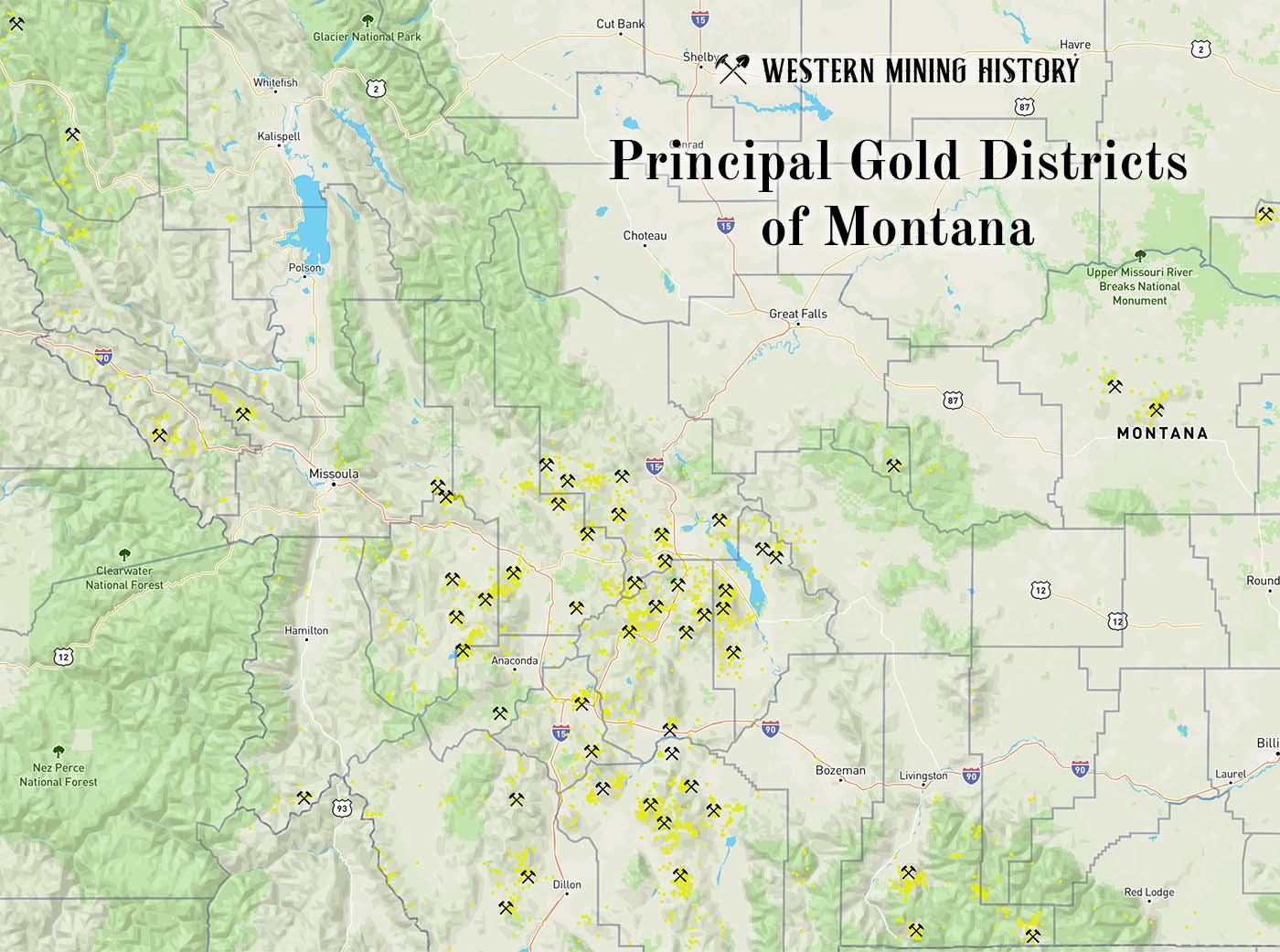The Joyanna Lode Claim is a silver, tungsten, gold, manganese, and fluorine-fluorite mine located in Madison county, Montana at an elevation of 8,199 feet.
About the MRDS Data:
All mine locations were obtained from the USGS Mineral Resources Data System. The locations and other information in this database have not been verified for accuracy. It should be assumed that all mines are on private property.
Mine Info
Elevation: 8,199 Feet (2,499 Meters)
Commodity: Silver, Tungsten, Gold, Manganese, Fluorine-Fluorite
Lat, Long: 45.56667, -111.96667
Map: View on Google Maps
Joyanna Lode Claim MRDS details
Site Name
Primary: Joyanna Lode Claim
Commodity
Primary: Silver
Primary: Tungsten
Primary: Gold
Primary: Manganese
Primary: Fluorine-Fluorite
Location
State: Montana
County: Madison
District: Potosi
Land Status
Not available
Holdings
Not available
Workings
Not available
Ownership
Owner Name: E. Roy Grigg
Production
Not available
Deposit
Record Type: Site
Operation Category: Prospect
Operation Type: Unknown
Discovery Year: 1941
Discovery Method: Unknown
Years of Production:
Organization:
Significant: N
Physiography
General Physiographic Area: Rocky Mountain System
Physiographic Province: Northern Rocky Mountains
Mineral Deposit Model
Not available
Orebody
Form: IRREGULAR
Structure
Type: R
Description: Tobacco Root Batholith
Alterations
Not available
Rocks
Name: Quartz Monzonite
Role: Host
Age Type: Host Rock Unit
Age Young: Neoproterozoic
Analytical Data
Analytical Data: ASSAY REPORT { SAMPLE 666 FROM DISCOVERY CUT NO. 1 - 1961: SILVER - TRACE, TUNGSTEN TRIOXIDE - 0.10% {{ SAMPLE 667 FROM DISCOVERY CUT NO. 1 - 1961: SILVER - 0.10 OZ. PER TON, TUNGSTEN TRIOXIDE - 0.20% {{ SAMPLE 668 FROM DISCOVERY CUT NO. 1 - 1961: GOLD - TRACE, SILVER - 0.20 OZ. PER TON, MANGANESE - 0.351% {{ SAMPLE 669 FROM DISCOVERY CUT NO. 1 - 1961: GOLD - TRACE, SILVER - 0.80 OZ. PER TON, TUNGSTEN TRIOXIDE - 0.08%, 1962: CALCIUM FLUORIDE - 0.48% {{ ASSAY REPORT FOR 1965 { SAMPLES 666, 667, 668, 669, WERE RECALCULATED AT 1965 MARKET PRICES. {{ SAMPLE J 2002 FROM DISCOVERY CUT NO. 1 - GOLD AND TUNGSTEN: TRACE, SILVER: 0.80 OZ. PER TON {{ SAMPLE J 2003 FROM DISCOVERY CUT NO. 1 - GOLD: TRACE, SILVER: 1.7 OZ/TON, MANGANESE: 0.38 LTU 48% GRADE, TUNGSTEN: 0.58 STU 65% GRADE {{ ASSAY REPORT 1968 { SAMPLES - 666, 667, 668, 669, J-2002, J-2003 RECALCULATED BY 1968 MARKET PRICES.
Materials
Not available
Comments
Comment (Workings): ON CLAIM - DISCOVERY CUT NO. 1 - 300 FT LONG BY 10 FEET WIDE BY 4-6 FEET DEEP; ADIT - UNKNOWN LENGTH; NO. 2 ADIT - PRESENTLY CAVED IN AT PORTAL.
Comment (Geology): TOBACCO ROOT BATHOLITH: THIS BATHOLITH HAS INTRUDED THE PRE-BELTIAN, PRECAMBRIAN METAMORPHIC ROCKS AND PALEOZOIC SEDIMENTARY ROCKS DURING LARAMIDE OROGENY, WHICH OCCURED IN THIS AREA DURING LATE CRETACEOUS OR EARLY EOCENE TIME. {{ SEDIMENTARY FORMATIONS: PLEISTOCENE MORAINE AND RECENT STREAM ALLUVIUM WHICH COVER THE CANYON FLOOR. {{ METAMORPHIC ROCKS: MADE UP OF THOUSANDS OF FEET OF DARK-COLORED GNEISSES AND SCHISTS BELONGING TO THE PONY SERIES OF PRECAMBRIAN AGE. {{ IGNEOUS ROCKS: THE TYPICAL IGNEOUS ROCKS ARE QUARTZ-MONZONITE COMPOSED OF ABOUT 20% QUARTZ, 30% ORTHOCLASE, 40% PLAGIOCLASE, FLEDSPARS, LESS THAN 3% BIOTITE, AND 1% HORNBLENDE. ACCESSORY MINERALS ARE ABOUT 2% SPHENE, 1% APATITE, AND 2% MAGNETITE AND SULFIDES (PYRITE).
Comment (Commodity): SAMPLES FROM DISCOVERY CUT NO. 1
Comment (Location): ALL LOCATIONS ESTIMATED FROM SECTION CORNERS; GOOD TO WITHIN ONE MILE OF EXACT LOCATION.
References
Reference (Deposit): 1965 DIREXPL USFS
Reference (Deposit): 1968 DIREXPL USFS
Reference (Deposit): 1961 DIREXPL USFS
Principal Gold Districts of Montana

In Montana, 54 mining districts have each have produced more than 10,000 ounces of gold. The largest producers are Butte, Helena, Marysville, and Virginia City, each having produced more than one million ounces. Twenty seven other districts are each credited with between 100,000 and one million ounces of gold production. Read more: Principal Gold Districts of Montana.